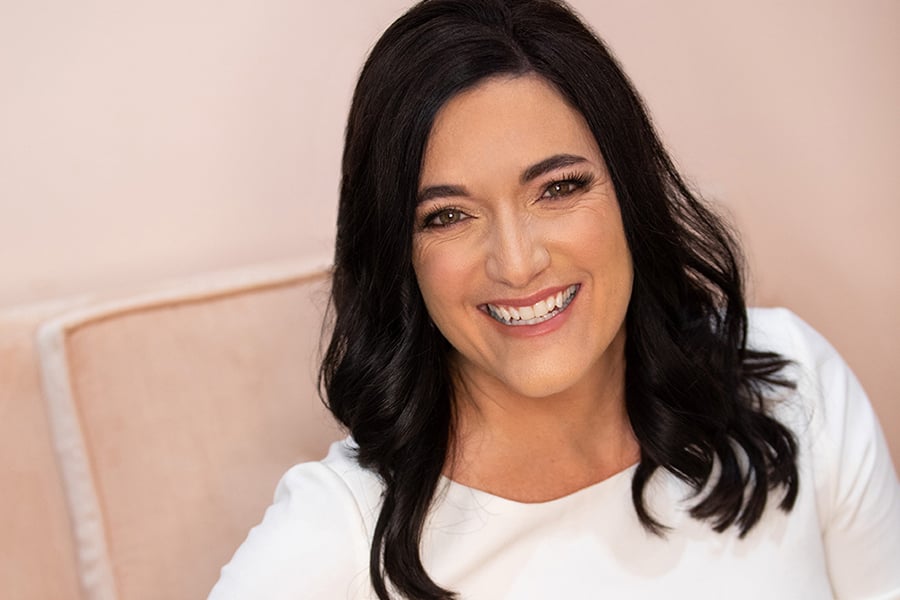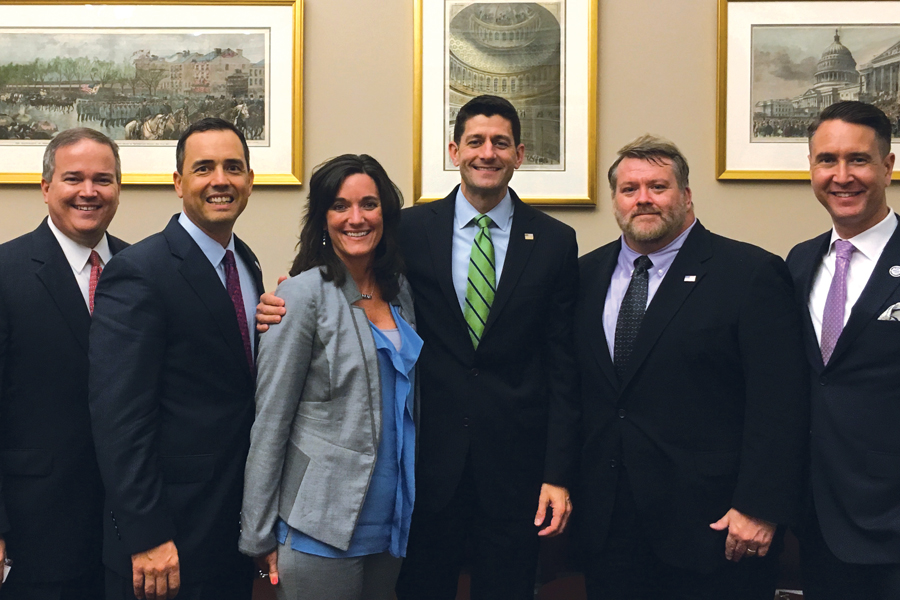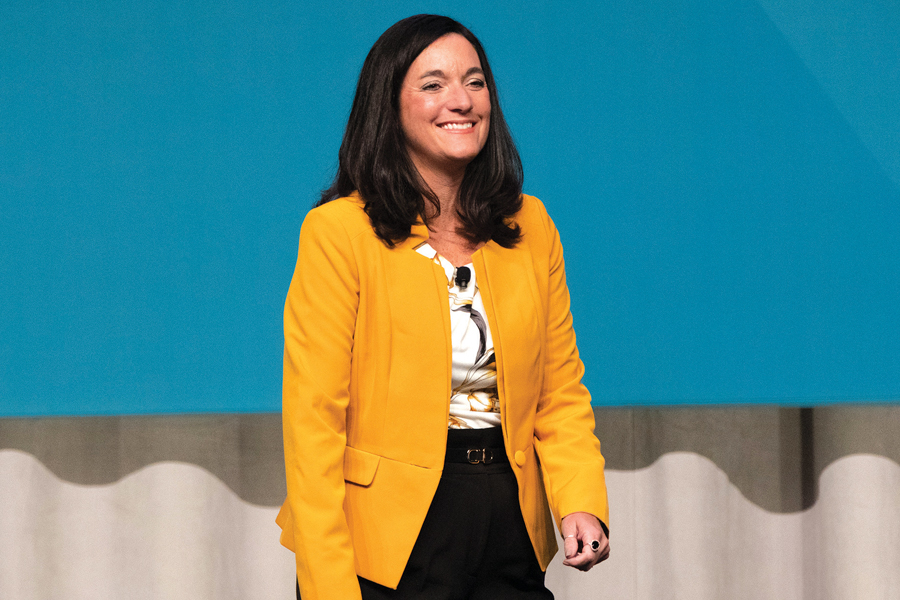

It’s unusual for someone just 53 years old to be recognized for lifetime achievement, but Amy Webber’s career in wealth management has been anything but usual.
“As honored as I am with a lifetime achievement, I hope I have a lot of lifetime left,” Webber said. “I’m excited to put some time and energy in whatever I have left, which is hopefully a long, long time.”
She is chief executive of Cambridge Investment Research, one of the industry’s largest independent broker-dealers. With $137 billion in assets under advisement as of June 30, Cambridge is the largest IBD led by a woman. Since 2008, when Webber became president, Cambridge’s total revenue has climbed from $241 million to $1.37 billion, and the number of producing advisers has grown from about 1,300 to more than 3,800.
Her impact on the industry extends far beyond the corporate balance sheet. Webber served on the Financial Services Institute’s board of directors for three years before she was elected to the Financial Industry Regulatory Authority Inc.’s board of governors in 2017. After her four-year term as an industry governor for independent dealers and insurance affiliates — and as a member of Finra’s regulatory oversight committee — Webber was reelected to FSI’s board in 2022. And now, InvestmentNews recognizes Webber, a member of the InvestmentNews inaugural Woman to Watch class in 2015, with its Alexandra Armstrong Lifetime Achievement award, given to one outstanding woman annually in the financial advisory and investment sphere.
Webber has spent decades working to make wealth management a more welcoming space for women. She hosts an annual Community of Women forum to bring together professionals from across the industry, and serves as the executive sponsor for Cambridge’s diversity, equity and inclusion committee and advisory council. These initiatives have led to tangible results at the broker-dealer, where 66% of the home office associates are women, as are 50% of the firm’s vice presidents.
“I think future investors are definitely going to be served better if they have the option of having somebody just like them,” Webber said. “As the world becomes more and more diverse, so should the industry. We will be healthier for it.”
She is especially passionate about encouraging the next generation to consider financial advice as a profession, particularly those who don’t take a traditional path into the industry.
After all, she didn’t.
Webber never earned a bachelor’s degree. A turn at a local investment firm as a college work-study assignment was a detour that set her direction. Her off-road career path, combined with deeply ingrained Midwest values, has propelled much of her advocacy both for women and for nontraditional talent who need only to be welcomed into an industry they don’t realize wants them.
Mari Buechner, who worked with Webber back in 1987 at that pivotal work-study job and is now president and CEO of that same firm, recalls when she and Webber were the only women in the room.
“It was important to us that we were the right person to be in that role, to have the confidence to add value and the experience to work cohesively with our peers,” Buechner said.

In those rooms, Webber saw a chance to push for change and tackle the industry’s biggest issues, even if some of her male colleagues didn’t want to. She could either get them excited about the new initiatives she had in mind, or least get them to move to a different committee to avoid working with her, Webber said. She blended respect for established industry players with fresh ideas and people, rapidly crafting a lifelong strategy.
Her early experiences also frame Webber’s philosophy on winning new talent for the company and the industry. When Cambridge first developed its internship program, the initial proposal was to target juniors and seniors at traditional four-year colleges. Webber broadened the outreach. “We hire people from the street who don’t know what a broker-dealer is, just like me,” she said.
Born in Cuba City, a small town of roughly 2,000 people in southwestern Wisconsin, Webber is the oldest of three girls born to Dave Timmerman, who worked for more than 30 years as a welder for John Deere, and his wife, Kathy, a nurse’s aide at the local hospital.
Though the family didn’t have the money to invest — Webber was the first financial planner they worked with — they imparted a deeply rooted work ethic. She started working a young age, picking up babysitting gigs and working nights at the local pizza shop.
She graduated from high school in 1987 and embarked on a legal career — corporate attorney, she hoped — by enrolling in a legal assistant program in Madison, Wisconsin.
By a stroke of luck, Webber’s work-study assignment landed her at Coordinated Capital Securities, a small broker-dealer owned at the time by a husband and wife with about four other employees, she said.
“At the time, I didn’t feel like I was lucky,” Webber admitted. Without the internet to research the firm or learn about investing, she assumed the job would be accounting. “While I’m good at numbers, I definitely did not have my sights set on a career in accounting or math, and I thought that’s what I was destined to spend 1 p.m. to 5 p.m. every day for a semester, or a year, doing.”
She began in September 1987. One month later, the markets collapsed.
Webber spent her time working the phones, taking calls from registered representatives and sending orders to the clearing firms. She saw first-hand how brokers were trying to help navigate clients through a difficult time, and it showed her a side of the financial services industry that ignited her career.
“I realized even as an 18-year-old during that period that even though I’d only been there for a month and really didn’t know anything, this is a business of relationships and people, not math and accounting,” she said. “I decided I really did want to go and get a degree in finance.”
But instead of leaving Coordinated Capital to enroll in a four-year program at the University of Wisconsin, Webber accepted an offer to work full time at the firm while attending night classes at a local technical college to earn an associate degree (with tuition covered by Coordinated), using weekends to work on her securities licenses.
“This is a business of relationships and people, not math and accounting.”
Amy Webber
The shift ended any college partying before it started, but for a young woman from a blue-collar family with two sisters coming behind her, the opportunity for a free education was too good to turn down.
Webber worked for Coordinated Capital for seven years, learning everything from operations to compliance, recruiting and customer service before the promise of warmer weather lured her to Phoenix for a job with SunAmerica (now SagePoint).

But after she met and married her husband, Matthew Webber, and had her first child, the family decided it would be best to return to the Midwest in 1998.
That’s when a headhunter introduced her to Eric Schwartz, founder and CEO of a relatively new broker-dealer in Fairfield, Iowa, which wanted to generate revenues from fees rather than product commissions.
After an initial phone call, Schwartz knew he wanted Webber on the team. Not only was it rare to find someone with brokerage industry experience who wanted to move to small-town Iowa to work for an upstart broker-dealer, but Webber also had the operational skills, including customer service and experience with the Pershing custodial platform, that he was looking for.
“We had the same way of seeing the world, the same way of dealing with things,” Schwartz said. “In my mind it was already done just on the phone call.”
But Webber sealed the deal after a delayed flight from Phoenix to Des Moines meant she wouldn’t have time to get to her hotel, change into an interview outfit and make it to her 5 p.m. meeting at Cambridge. She called to give Schwartz a choice: She could either make the meeting in jeans with husband Matt and baby Dakota in tow or could arrive late in full business attire.
Schwartz chose the former, and after meeting Webber and her family, offered a job that night.
“She knew a lot about the industry, she had a great sense for people, and she totally knew our business,” he said. “That was a rare combination.”
Though Schwartz offered to pay Webber more than he was taking home himself, it was still less than she was making at SunAmerica. But Webber was attracted to Cambridge’s philosophy of independent fee-based advisers, as well as the company’s four values: integrity, commitment, flexibility and kindness.
“Back then, this definitely did feel in some ways like a step backwards, but it was exciting,” Webber said. “It was the autonomy and freedom to help [Schwartz] continue to build, the foundation of finding financial advisers who had like-minded core values as ours.”
The Webber family moved to Iowa so that she could become the 22nd employee at Cambridge, where she has spent the last 24 years putting her own stamp on the company’s direction. Schwartz named her president in 2008 and as his successor as CEO in 2017.
Early on, Schwartz recognized Webber’s skills with people and tasked her with hiring Cambridge’s customer service team.
“She was really good with picking the right people to hire and then mentoring them,” he said, adding that some of those she hired to entry level positions are now vice presidents. “She’s not always going to hire the person with the best skill set because she could train that, but she was looking for people with the attitude of serving others, of treating others well.”
Without having a deep well of financial services talent in Fairfield to tap into, Webber instead looked for those in traditional small-town careers, such as grocery store clerks or restaurant servers. She believes this has given Cambridge an advantage in building a successful firm in the American heartland.
“We can hire and train from the ground up, and there’s not another firm two blocks down the street that’s going to recruit them after we train them,” she said.
Though Webber has worked in three firms that had gender diversity baked into the corporate DNA — her boss at SunAmerica was a woman, and the other entry-level employees working alongside her at Coordinated Capital were all women — she still feels there’s work to be done to make the industry more inclusive.

To that end, she helped launch an internship program that has brought in more than 240 students over 11 years, worked with a high school in Fairfield to add financial services to the school’s career services, and serves on the board of trustees of Indian Hills Community College in Ottumwa, Iowa.
“For decades she has been a pioneer in advancing women in the industry through mentorship and sharing her own experiences,” Buechner said. “Leaders find opportunities, make them happen and create success. That’s Amy.”
In August, Webber handed over the title of president to Cambridge’s executive vice presidents — Colleen Bell, Jeff Vivacqua and Seth Miller. The hope is that delegating the duties will free up more time for initiatives that bring meaningful change to wealth management.
One of the tasks facing the new leadership team is responding to an SEC charge filed in March that Cambridge had failed to disclose material conflicts of interests to clients. A spokesperson said that Cambridge denies the allegations and intends to “vigorously defend” itself.
Webber wants to spread the message that the modern independent financial advice business is an excellent career choice for women that can be both personally rewarding and offer the flexibility for those looking to be mothers. Webber also wants to help change mentalities within the industry that can make women feel unwelcome.
“I didn’t talk about being a woman and definitely didn’t share that I was pregnant or that I had morning sickness like nobody’s business with my first child,” she said. “I didn’t tell any of the men around me that was going on because it was probably in my mind going to be perceived as a sign of weakness.”
She also wants to spend time adapting Cambridge to evolving business models, including new fee structures and teaming approaches favored by next-generation advisers. There’s also room to improve DEI initiatives to create better pipelines that are intentional about bringing in candidates across gender and racial backgrounds, she said.
With both of her children now adults, Webber is living the life of an empty nester. She’s enjoying traveling with Matt and recently has picked up scuba diving. But even though she’s had more accomplishments in 35 years in the industry than many have in a lifetime, she says there’s plenty more to go.
“Lifetime achievement makes me a little nervous because I’ve got a lot more work to do,” Webber said. “Maybe I can earn a double lifetime honor sometime 20 years from now.”

Executives from LPL Financial, Cresset Partners hired for key roles.

Geopolitical tension has been managed well by the markets.

December cut is still a possiblity.

Canada, China among nations to react to president-elect's comments.

For several years, Leech allegedly favored some clients in trade allocations, at the cost of others, amounting to $600 million, according to the Department of Justice.
Streamline your outreach with Aidentified's AI-driven solutions
This season’s market volatility: Positioning for rate relief, income growth and the AI rebound
